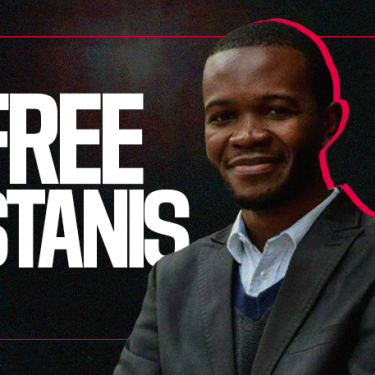“My imprisonment is a test for independent journalism’s future in the DRC,” jailed reporter tells RSF

Reporters Without Borders (RSF) has visited a reporter who has been jailed arbitrarily in the Democratic Republic of Congo for the past six weeks. Stanis Bujakera Tshiamala is still combative and hopes that the law and the truth will soon prevail so that he can be freed.
A reporter for Jeune Afrique, a Paris-based news weekly specialising in covering Africa, Stanis Bujakera Tshiamala, had only just learned that his lawyers’ fourth request for his provisional release had been rejected when he received a visit on 17 October from an RSF delegation consisting of Sadibou Marong, the head of RSF’s sub-Saharan Africa bureau, and Arnaud Froger, the head of its investigation desk. They were accompanied by one of his lawyers, Charles Mushizi.
“The morale is there,” Stanis Bujakera Tshiamala told RSF. “There is no way I will give in to imaginary accusations.”
The journalist is accused of “fabricating” and disseminating a Congolese intelligence agency document that blamed another Congolese intelligence agency for an opposition politician’s death. The document was the basis of a story published by Jeune Afrique on 31 August that did not carry Stanis Bujakera Tshiamala’s by-line. He was nonetheless arrested on 8 September.
Held in Kinshasa’s Makala prison, Stanis Bujakera Tshiamala was calm and combative during the visit although the judicial system is persisting in prolonging his detention despite the absence of any serious evidence in support of the accusation against him. Attired in the yellow shirt that all inmates are required to wear, he spoke with determination when he said the case was also “a test for independent journalism’s future in the DRC.”
“Stanis Bujakera Tshiamala is a professional journalist who has absolutely no business being in the prison where RSF met him three days before a new hearing is due to begin on 20 October. The charges against him are absurd and the decision to keep holding him is insane. The use of such methods to gag one of the country’s leading journalists in the run-up to a presidential election raises grave concerns about the credibility of the conditions in which this election will be held.
Makala prison has a grim reputation. It is currently holding more than 10,000 inmates although it was designed for only 1,500. Access to drinking water is non-existent. Dozens of detainees die every year from diseases or malnutrition, according to the Research and Information Group on Peace and Security (GRIP), an independent research centre based in Belgium.
